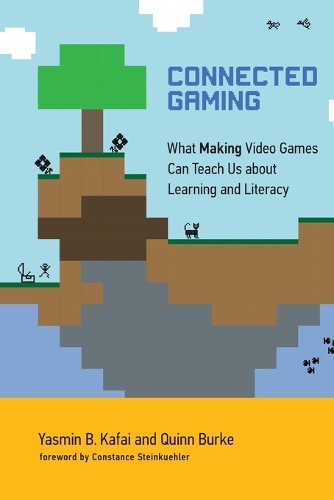
Connected Gaming: What Making Video Games Can Teach Us about Learning and Literacy
(Paperback)
Available Formats
Publishing Details
Connected Gaming: What Making Video Games Can Teach Us about Learning and Literacy
By (Author) Yasmin B. Kafai
By (author) Quinn Burke
Foreword by Constance Steinkuehler
MIT Press Ltd
MIT Press
19th March 2024
United States
Classifications
Professional and Scholarly
Non Fiction
Computer games / online games: strategy guides / companion works
Digital and information technologies: social and ethical aspects
371.334
Physical Properties
Paperback
224
Width 152mm, Height 229mm
369g
Description
Over the last decade, video games designed to teach academic content have multiplied. Students can learn about Newtonian physics from a game or prep for entry into the army. An emphasis on the instructionist approach to gaming, however, has overshadowed the constructionist approach, in which students learn by designing their own games themselves. In this book, Yasmin Kafai and Quinn Burke discuss the educational benefits of constructionist gaming-coding, collaboration, and creativity-and the move from "computational thinking" toward "computational participation." Kafai and Burke point to recent developments that support a shift to game making from game playing, including the game industry's acceptance, and even promotion, of "modding" and the growth of a DIY culture. Kafai and Burke show that student-designed games teach not only such technical skills as programming but also academic subjects. Making games also teaches collaboration, as students frequently work in teams to produce content and then share their games with in class or with others online. Yet Kafai and Burke don't advocate abandoning instructionist for constructionist approaches. Rather, they argue for a more comprehensive, inclusive idea of connected gaming in which both making and gaming play a part. How making and sharing video games offer educational benefits for coding, collaboration, and creativity. Over the last decade, video games designed to teach academic content have multiplied. Students can learn about Newtonian physics from a game or prep for entry into the army. An emphasis on the instructionist approach to gaming, however, has overshadowed the constructionist approach, in which students learn by designing their own games themselves. In this book, Yasmin Kafai and Quinn Burke discuss the educational benefits of constructionist gaming-coding, collaboration, and creativity-and the move from "computational thinking" toward "computational participation." Kafai and Burke point to recent developments that support a shift to game making from game playing, including the game industry's acceptance, and even promotion, of "modding" and the growth of a DIY culture. Kafai and Burke show that student-designed games teach not only such technical skills as programming but also academic subjects. Making games also teaches collaboration, as students frequently work in teams to produce content and then share their games with in class or with others online. Yet Kafai and Burke don't advocate abandoning instructionist for constructionist approaches. Rather, they argue for a more comprehensive, inclusive idea of connected gaming in which both making and gaming play a part.
Author Bio
Yasmin B. Kafai is Lori and Michael Milken President's Distinguished Professor at the University of Pennsylvania Graduate School of Education, coauthor of Connected Gaming, Connected Code, and Connected Play (all published by MIT Press) and other books. Quinn Burke is a Senior Research Scientist in the Learning Sciences at Digital Promise. Quinn's research examines the effectiveness of different coding activities for introducing computer science and computational thinking to students. Quinn's research has been supported by a number of state and federal grants. Previously, Quinn taught at the college and high school levels.
